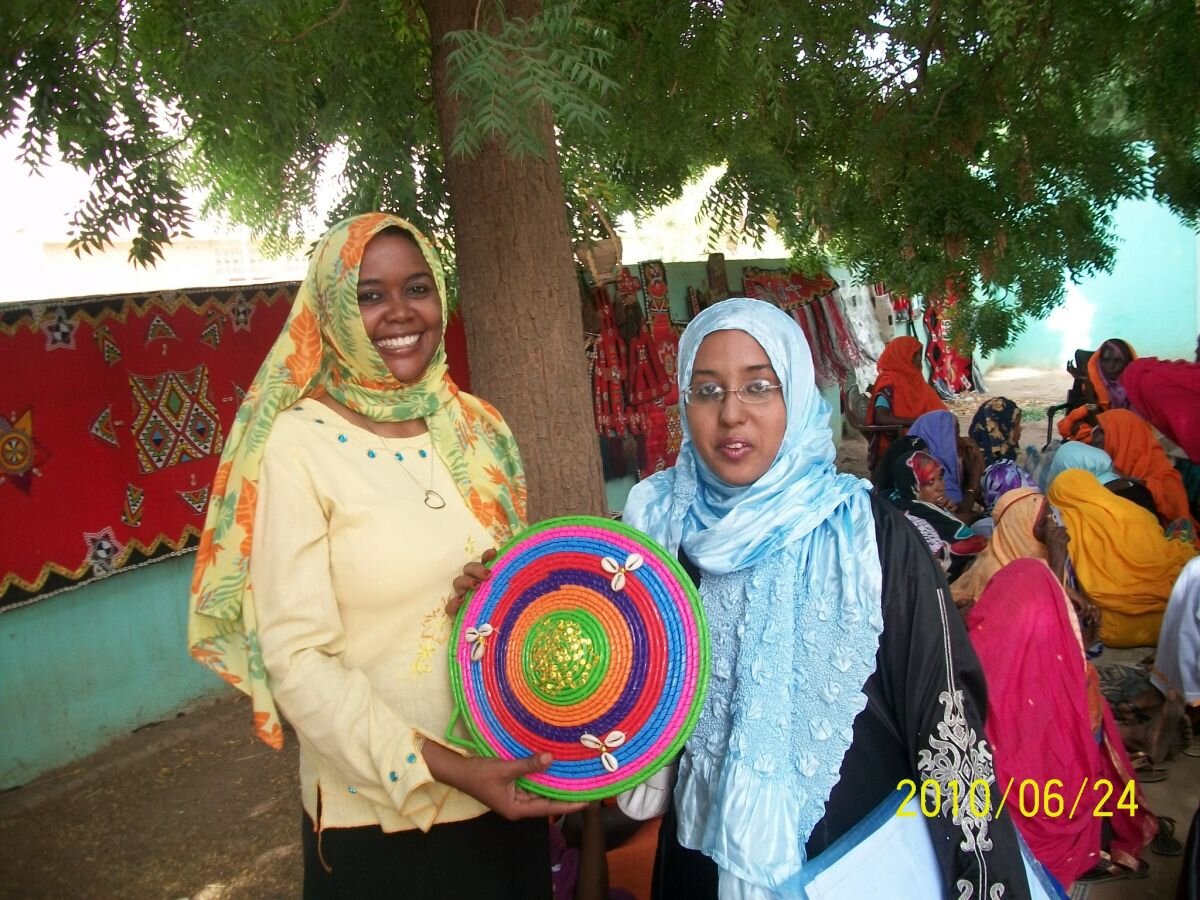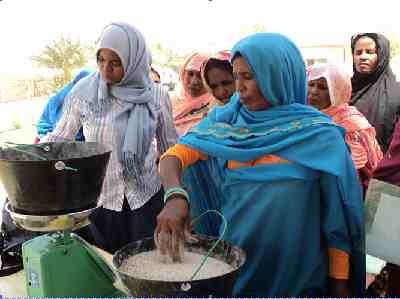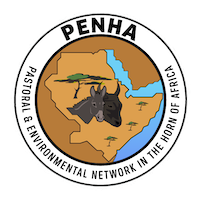PENHA in Sudan
For this purpose in some areas of the country financial institutions and cooperatives have been established for livestock owners and export and marketing of livestock is on the increase. However, Sudanese (agro) pastoralists are still facing a wide range of problems. Poverty, drought, the lack of educational programmes for pastoralists and natural resource-based conflicts (Darfur) are major issues of concern.
Country profile
Population
42 million
Agro-pastoralist population
60%
Surface area
1,104,300 km2
Land occupied by pastoralists
60%
Human Development Index (HDI)
0.507
Our work in Sudan

Economic empowerment of women
This project aims to empower women in pastoralist communities who are disadvantaged and living under difficult socio-economic conditions in arid and semi-arid areas.
It is equipping women with business and production skills, and by promoting their access to rural finance providers (where these exist) as well as their access to markets, will help the beneficiaries to undertake new economic activities or expand existing ones and thereby increase their incomes. It is taking place in Uganda and Somaliland in addition to Sudan. The picture shows a women’s group meeting which was organised by one of PENHA Sudan officers at Gulsa settlement in Kassala state.
Read moreIt is equipping women with business and production skills, and by promoting their access to rural finance providers (where these exist) as well as their access to markets, will help the beneficiaries to undertake new economic activities or expand existing ones and thereby increase their incomes. It is taking place in Uganda and Somaliland in addition to Sudan. The picture shows a women’s group meeting which was organised by one of PENHA Sudan officers at Gulsa settlement in Kassala state.
Objectives
1) To equip women with the skills and knowledge needed to undertake new enterprises
2)To increase women’s access to finance and markets
3) To advocate for positive micro-finance policies vis-a-vis women in pastoral areas as well as equitable access to credit
Activities
This project started in December 2008, so the project is still in the initial stages. The following activities have been completed so far:
1) Identifying project implementation sites and women groups which were selected from three villages in Kassala State
2) Conducting action-oriented research: Mapping and obtaining data and information
3) Completing a needs assessment (April 2009)
4) The latter two activities have been published as a baseline study.
Read the study here.
Achievements
Beneficiaries are so far, 40 women from 3 pastoral communities but there will be indirect beneficiaries of over 2,000 women. We aim at a maximum impact on women’s groups living in Eastern Sudan through this project. Therefore beneficiaries will be expanded as widely as possible.
1) Identifying project implementation sites women groups were selected from three villages
2) Conducting action-oriented research: Mapping and obtaining data and information
3) Completing a need assessment (April 2009)
At the end of February 2012, PENHA in partnership with PEAKS held a Policy Advocacy workshop with four of the local Women’s Leagues as part of the PENHA funded regional Women’s Economic Empowerment Programme (WEEP). The groups were from Kassala City, Kassala Rural, Griba and Halfa.
The main purpose of the workshop and exhibition was both to develop the women’s handicraft skills using local material, and to demonstrate what they had done. The material used included palm leaves and techniques such as sewing, suk suk and other methods.
A report on this workshop can be downloaded as a PDF here.

Kassala pastoralist education project
Tree Seedlings as a practical teaching subject
This was a one year project with ambitious aims funded by the Methodist Relief and Development Fund. It had a major practical aspect the growing of tree seedlings by the pupils in the three schools involved for sale to help in the regeneration of the local forests which have been seriously depleted.
Read moreThis was a one year project with ambitious aims funded by the Methodist Relief and Development Fund. It had a major practical aspect the growing of tree seedlings by the pupils in the three schools involved for sale to help in the regeneration of the local forests which have been seriously depleted. The other parts including the suggested development of literacy text books, the provision of games equipment and the holding of education workshops for parents, teachers, government officials and community leaders. In practice, this could not all be done. The main part, the development of the practical growing of tree seedlings, was a very considerable success.
The volunteer who ran the project for PENHA said the following:
“There was really a new input to the curriculum. The project has demonstrated and proved the value of this practical part of the curriculum and the schools and pupils wanted to follow it.”
The Nomadic Education Department of Kassala State supported this approach. There was strong support for the project. Social and Community leaders were very committed. They and the education department helped with the transport of materials for the tree growing nurseries. The value of the approach is shown by the interest that has been taken in the programme by a number of other schools in the area. It has integrated theory with practice for pupils and teachers. This is a fundamental pedagogic result which is particularly beneficial in a country where teaching in schools tends to be always very theoretical, even in basic or primary schools. The picture on the right-hand side shows a nursery bed built by teachers and children and funded by the Methodist Relief and Development Fund.
Achievements
Project beneficiaries are 40 students in 3 different schools
1) Gulsa primary level school, 285 boys and 315 girls (the remotest one)
2) Amara primary school, 400 girls and 250 boys
3) Om Alkura primary school, 505 girls only
In addition to these, community members surrounding schools are also beneficiaries:
1) Students who was involved in taking care of plants gained knowledge and skills to grow plants as well as learning how to work together with other students
2)Teachers developing material regarding seed planting as part of their training All three teachers completed their own training. Three to four cycles of the purchase of seeds, soil, plastic bags, etc. followed by planting and growing the seedlings until they could be sold and replanted were completed in each school.
3) Regular monitoring took place. Sales and use of seedlings were accomplished
4) Communities surrounding the school worked together with them

Supporting basic education among pastoralists in Kassala State
The generosity of the South Holland Rotary Club (based in Spalding, Lincs) allowed PENHA to distribute school equipment to seven schools.
These were in settlements which were between 15 and 170 km from the regional centre of Kassala, itself only about 20 km from the Eritrean border. The population is mainly pastoralist though with many refugees from Eritrea…
Read moreThese were in settlements which were between 15 and 170 km from the regional centre of Kassala, itself only about 20 km from the Eritrean border. The population is mainly pastoralist though with many refugees from Eritrea. A total of 525 exercise books, 855 pencils, 355 writing boards, 170 rulers, 160 pencil rubbers and 185 pencil sharpeners along with 170 bags for protecting the children’s books and writing equipment were given to the school children. Some equipment for games (balls, skipping ropes and a few footballs and whistles) was also provided. Even the boxes which were used to send the material to Sudan are being used again for sending some material for making fodder to pastoralists across the border in Eritrea. Nothing is wasted and the boxes will be used again and again.
Read lessBooks for primary schools in Eastern Sudan
The South Holland Rotary Club along with its Rotary District (1070) provided major funding for purchasing 2,000 books in Arabic (the language of instruction in Eastern Sudan).
The funds were administered in Sudan by the Khartoum Rotary Club which arranged for buying the books. PENHA Sudan organised the transport to Kassala, and the Pastoralist Environment Association Kassala State (PEAKS, a local grassroots community-based organisation) were responsible for distributing the books to the six schools.
Read moreThe funds were administered in Sudan by the Khartoum Rotary Club which arranged for buying the books. PENHA Sudan organised the transport to Kassala, and the Pastoralist Environment Association Kassala State (PEAKS, a local grassroots community-based organisation) were responsible for distributing the books to the six schools.
The schools were: Silke School, Edgi School, Hilat sidig School, Um ashosh School, Abu hasheila School and Karti School.
Each school was given between 310 and 345 books. Six of the books were textbooks on basic Arabic, and two were basic Maths books. In addition, copies of the Holy Quran were provided.
In his report of the distribution of the books, Abdelgani, PENHA’s main contact in Sudan said that the lack of books is a real crisis for many schools. Some schools have no books other than the one used by the teacher and even in the better-provided schools, five children will be expected to share each book. He finished by saying “More investment in this issue is crucial.”
PENHA remains committed to supporting and developing the education of pastoralists.

Prosopis as animal feed
Animal fodder training for women in the Khashm El Ghirba region of Kassala State (2011)
In days gone by, pastoralists in the Horn of Africa were able to roam far and wide – so that in the dry season (which in this part of Sudan is 10 months of the year) they used to travel long distances to areas where fodder was available for their animals – by rivers and small lakes.
Read moreIn days gone by, pastoralists in the Horn of Africa were able to roam far and wide – so that in the dry season (which in this part of Sudan is 10 months of the year) they used to travel long distances to areas where fodder was available for their animals – by rivers and small lakes. With the increase in population and the growth of arable agriculture, much of the traditionally available pastures have either been taken over for arable agriculture or the migration routes have been made less accessible or closed off altogether. To meet this challenge, PENHA has worked with the government’s Animal Production Research Centre (APRC) in Khartoum to develop a feed which could be used in the dry season so that it is not necessary to have to migrate such long distances. This research has able to make positive use of a recently introduced shrub which had become a major problem in Sudan (and in the Horn of Africa as a whole) called “muskit” (Prosopis Juliflora) by the local people. A simple method has been developed, combining traditional knowledge with a new scientific approach, to use muskit with more traditional feeds.
The main objectives of these training programs were:
1) Exploring the indigenous knowledge of the women about animal fodder and combining this with scientific knowledge and so ending with optimal knowledge. Research has shown that the participation of the end beneficiaries in planning, execution and monitoring programmes guarantees success and sustainability.
2) Introduction of some modern and simple technologies for feed preparation and preservation

Alternative Animal Feeds for Pastoralist Communities in Kassala State
Phase 1: January 2008
The central strategy for this training is the transfer of better feeding technologies by training of trainers e.g. within line ministries and established local pastoralist non-governmental and community-based organisations and community leaders.
Read moreThe central strategy for this training is the transfer of better feeding technologies by training of trainers e.g. within line ministries and established local pastoralist non-governmental and community-based organisations and community leaders. In this way, the benefits are replicated in pastoral areas with local and federal government support. The trainees will be equipped with new knowledge, practical skills and tools on how to best use crop fodder and crop residue.
Objectives
1) Tackle poverty and food security among Sudanese pastoralists and agro-pastoralists through technical capacity building and training programmes for the development of the livestock-related activities
2) Advocate, promote and raise awareness among civil society and policymakers including local and central government and line ministries in Eritrea and Sudan to include pastoralist communities and livestock issues in the agenda of national development and food security. Change negative attitudes and approaches towards pastoralism within government policy making departments and development programme design.
3) Empower pastoralist communities and their institutions to play a full role in their own development.
4) Build capacity through support for and delivery of training for pastoralist Community-Based Organisations and front-line government staff (extension workers) working with pastoralists, agro-pastoralists and/or other livestock owners
5) Exchange and share knowledge, experiences and research data with other experts and pastoralists in Eastern Sudan and in Western Eritrea who face similar ecological and socioeconomic conditions.
Achievements
Nomadic pastoralists, agro-pastoralists and sedentary livestock owners who were chosen from different ethnic groups in Kassala state were the main beneficiaries of the training. Totally 33 pastoralist has benefited from the training on alternative fodder production skills of which 25% were women. A training was successfully developed by Animal
Phase 2: Training (end of 2008)
In total, 100 pastoralists attended training sessions and obtained skill and knowledge about more effective and efficient ways of animal feeding. They are now able to replicate the new knowledge in their areas.
Read moreIn total, 100 pastoralists attended training sessions and obtained skill and knowledge about more effective and efficient ways of animal feeding. They are now able to replicate the new knowledge in their areas.
As a result of the training, some participants have started spreading the knowledge they learned to their neighbours, relatives and other community members. The numbers who indirectly benefited from the training amounted to over 1,000 livestock owners in the Kassala State. As an extension of the training, the Pastoralist Environment Association in Kassala State (PEAKS) was formed to pursue a better livelihood for pastoralist in Eastern Sudan particularly in Kassala state. Through the mutual cooperation, the College of Veterinary Medicine and Animal Production, Animal Production Research Centre and PENHA, pastoralists groups in Kassala benefited in various ways, such as obtaining new skills, knowledge and ideas.
The training module developed in Sudan was used in Western Eritrea in January 2009 and 220 pastoralists and farmers were trained there.
Reports which describe and illustrate the training can be downloaded here:
The first is training in Halfa – download here.
The second was in Ghirba – download here.
